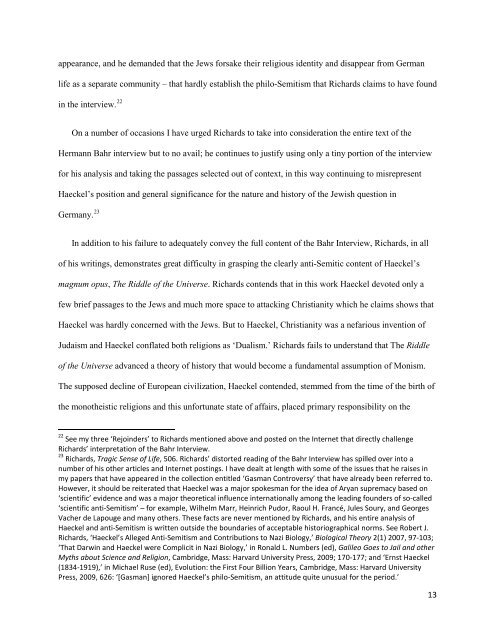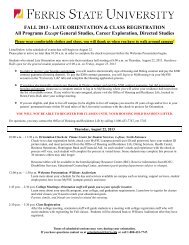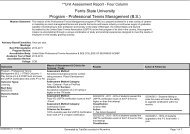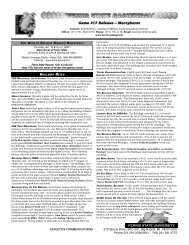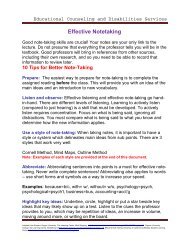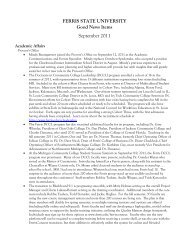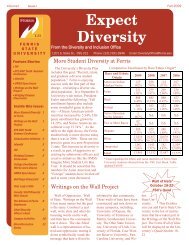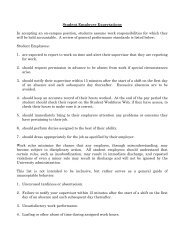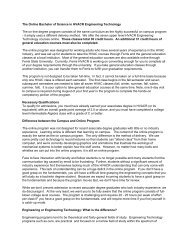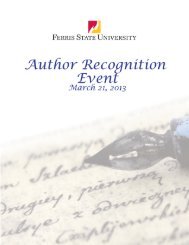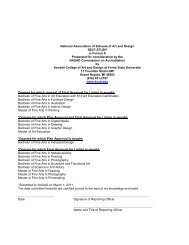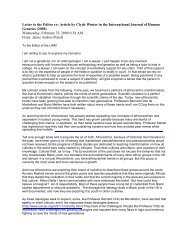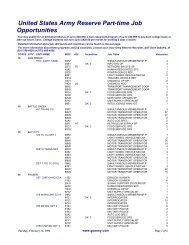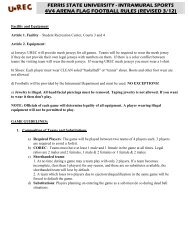Daniel Gasman - Ferris State University
Daniel Gasman - Ferris State University
Daniel Gasman - Ferris State University
You also want an ePaper? Increase the reach of your titles
YUMPU automatically turns print PDFs into web optimized ePapers that Google loves.
appearance, and he demanded that the Jews forsake their religious identity and disappear from German<br />
life as a separate community – that hardly establish the philo-Semitism that Richards claims to have found<br />
in the interview. 22<br />
On a number of occasions I have urged Richards to take into consideration the entire text of the<br />
Hermann Bahr interview but to no avail; he continues to justify using only a tiny portion of the interview<br />
for his analysis and taking the passages selected out of context, in this way continuing to misrepresent<br />
Haeckel’s position and general significance for the nature and history of the Jewish question in<br />
23<br />
Germany.<br />
In addition to his failure to adequately convey the full content of the Bahr Interview, Richards, in all<br />
of his writings, demonstrates great difficulty in grasping the clearly anti-Semitic content of Haeckel’s<br />
magnum opus, The Riddle of the Universe. Richards contends that in this work Haeckel devoted only a<br />
few brief passages to the Jews and much more space to attacking Christianity which he claims shows that<br />
Haeckel was hardly concerned with the Jews. But to Haeckel, Christianity was a nefarious invention of<br />
Judaism and Haeckel conflated both religions as ‘Dualism.’ Richards fails to understand that The Riddle<br />
of the Universe advanced a theory of history that would become a fundamental assumption of Monism.<br />
The supposed decline of European civilization, Haeckel contended, stemmed from the time of the birth of<br />
the monotheistic religions and this unfortunate state of affairs, placed primary responsibility on the<br />
22<br />
See my three ‘Rejoinders’ to Richards mentioned above and posted on the Internet that directly challenge<br />
Richards’ interpretation of the Bahr Interview.<br />
23<br />
Richards, Tragic Sense of Life, 506. Richards’ distorted reading of the Bahr Interview has spilled over into a<br />
number of his other articles and Internet postings. I have dealt at length with some of the issues that he raises in<br />
my papers that have appeared in the collection entitled ‘<strong>Gasman</strong> Controversy’ that have already been referred to.<br />
However, it should be reiterated that Haeckel was a major spokesman for the idea of Aryan supremacy based on<br />
‘scientific’ evidence and was a major theoretical influence internationally among the leading founders of so-called<br />
‘scientific anti-Semitism’ – for example, Wilhelm Marr, Heinrich Pudor, Raoul H. Francé, Jules Soury, and Georges<br />
Vacher de Lapouge and many others. These facts are never mentioned by Richards, and his entire analysis of<br />
Haeckel and anti-Semitism is written outside the boundaries of acceptable historiographical norms. See Robert J.<br />
Richards, ‘Haeckel’s Alleged Anti-Semitism and Contributions to Nazi Biology,’ Biological Theory 2(1) 2007, 97-103;<br />
‘That Darwin and Haeckel were Complicit in Nazi Biology,’ in Ronald L. Numbers (ed), Galileo Goes to Jail and other<br />
Myths about Science and Religion, Cambridge, Mass: Harvard <strong>University</strong> Press, 2009; 170-177; and ‘Ernst Haeckel<br />
(1834-1919),’ in Michael Ruse (ed), Evolution: the First Four Billion Years, Cambridge, Mass: Harvard <strong>University</strong><br />
Press, 2009, 626: ‘[<strong>Gasman</strong>] ignored Haeckel’s philo-Semitism, an attitude quite unusual for the period.’<br />
13


